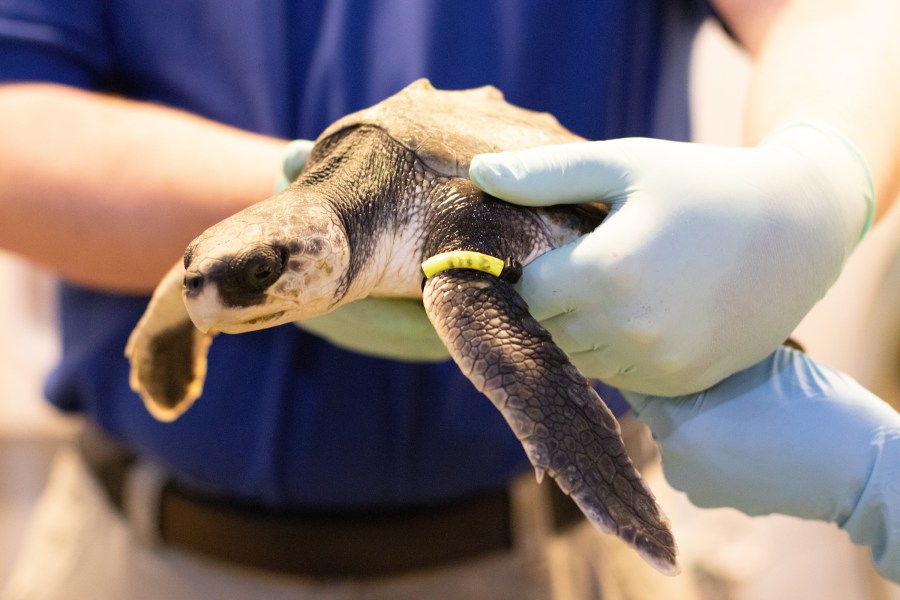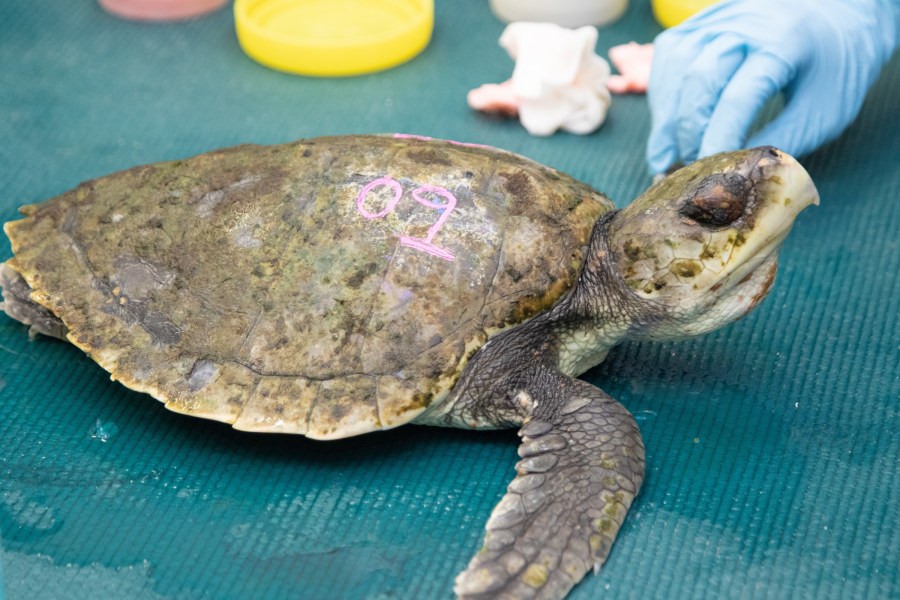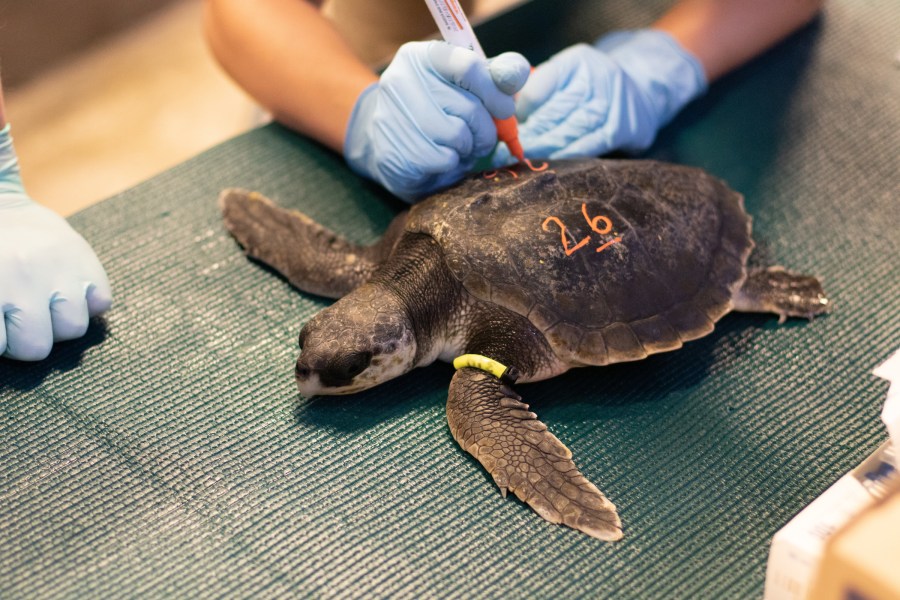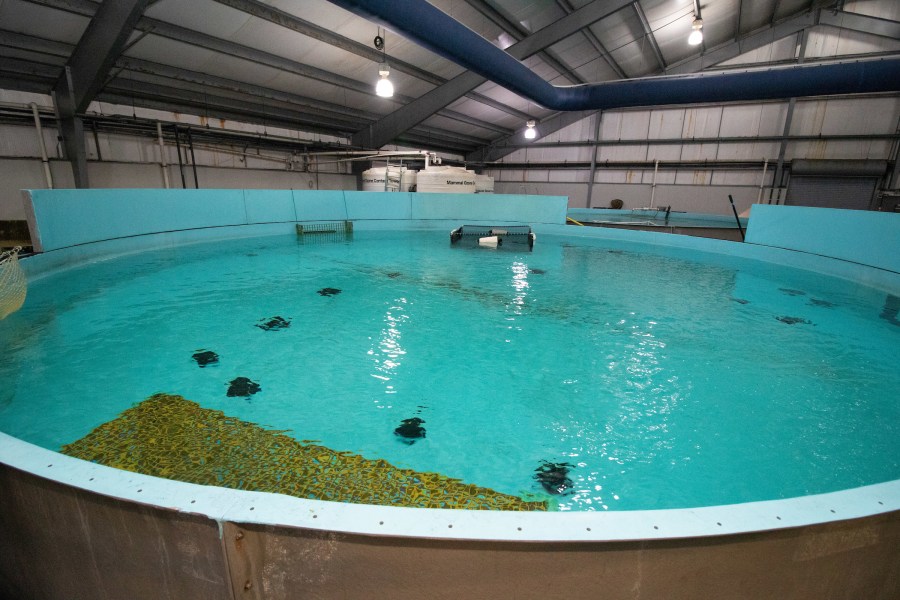NEW ORLEANS – Thirty endangered Kemp’s ridley sea turtles, part of a massive cold-stunning event along the New England coast, were transported to Audubon Coastal Wildlife Network (CWN) for rehabilitation and eventual release into the Gulf of Mexico.
Typically, sea turtles migrate to warmer waters in the fall, but, if they don’t make the migration before coastal water temperatures drop, they can suffer from hypothermia, also known as cold-stunning. Symptoms of cold-stunning can include decreased heart and respiration rates, decreased circulation, and lethargy. All can be followed by shock and pneumonia.
So far this season, rescue and rehabilitation efforts have been underway as hundreds of cold-stunned sea turtles wash up on the beaches of Cape Cod, MA. Staff and volunteers with Massachusetts Audubon Wellfleet Bay Wildlife Sanctuary rescue the turtles and take them to the New England Aquarium’s sea turtle hospital and to the National Marine Life Center, where they are stabilized before being flown to secondary rehabilitation facilities along the East Coast and Gulf of Mexico, including CWN, to continue treatment.

Of the thirty turtles CWN received, twenty-one turtles were sent from the New England Aquarium and nine were sent from the National Marine Life Center in Massachusetts.
“We were more than happy to jump in and offer our help with the rehabilitation of these sea turtles,” said Audubon Marine Mammal and Sea Turtle Stranding, Rescue, and Rehab Coordinator Gabriella Harlamert. “We are currently assessing the health of each turtle and getting them on a path to recovery in hopes that we will be able to release them back into the Gulf of Mexico in the months to come.”
On November 25, the rescued turtles took off from New England with Turtles Fly Too, Inc. which recruits “Turtle Fliers,” who donate their expertise, aircraft, fuel, and labor in order to assist the rescue efforts of endangered species around the country. NOAA Fisheries works with Turtles Fly Too to coordinate flights, which are freeing up valuable space for more cold-stunned turtles at the New England Aquarium and the National Marine Life Center.

“Our Turtle Fliers are always ready and generously contribute to assist in endangered species rescue. Robert and Jessica’s flexibility to persevere through the many complications that made up this ‘perfect storm’ experience lends volumes to the dedication of each of our 350 pilots. Turtles Fly Too provides affected rescue and rehabilitation agencies a rapid solution; whether we transport one or 70 sea turtles, at a value of between $10-$35K per flight,” said Leslie Weinstein, president of Turtles Fly Too.
Once with CWN, each turtle was given a physical examination and a swim test to determine their overall health and condition. In spite of the long transport journey, the turtles are in good condition and are already on the road to recovery.
Harlamert added, “This effort would not have been possible without the generous collaboration of organizations across the country who all value the conservation of this endangered species.”

CWN hopes to begin releasing some of the turtles into the Gulf of Mexico in as early as two months, but others may take longer to be cleared by veterinarians. In addition to cold-stunning, some of the turtles suffer from shell trauma and secondary effects from the cold-stunning, such as pneumonia.
CWN staff have create highly individualized treatment plans for each turtle and will monitor them intensively.
Coordinated by Audubon Nature Institute, CWN serves as NOAA Fisheries’ primary marine mammal and sea turtle stranding network partner in Louisiana.
CWN is committed to the humane care and treatment of injured, ill, or displaced marine animals in Louisiana and is the only entity in the state responsible for the rehabilitation of live marine mammals and sea turtles. The information CWN collects from stranded animals provides a snapshot into the health of the marine environment and provides a better understanding of threats to marine mammals and sea turtles in the wild.

The public is advised to report all stranded marine mammals and sea turtles (live or dead) to CWN at (504) 235-3005.
When reporting strandings, the public should be prepared to give:
- Exact location and/or GPS coordinates,
- Photographs of the animal, and
- Nature of the report (type of animal/live or dead/size, etc.).
Recommendations when reporting a live stranded animal include:
- Put human safety above animal safety. If conditions are dangerous, do not attempt to approach the animal.
- Keep crowds away and noise levels down to avoid causing stress to the animal.
- Don’t push an animal on shore back into the water.
- If the animal returns to the water on its own, don’t attempt to interact with it.
- Leave all entanglements that may be present on the animal.




